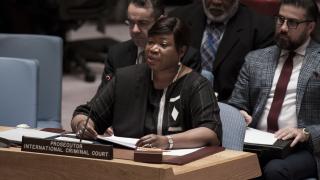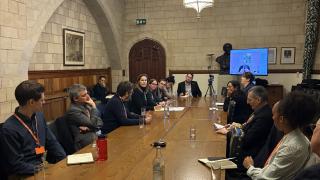
After a difficult week for the International Criminal Court (ICC), which saw both Burundi and South Africa announce their intentions to withdraw from the Court (subsequently followed by The Gambia), UNA-UK urges the UK Government to demonstrate its support by ratifying the “Kampala” amendments and pushing their allies to accede to the Rome Statute: the ICC's governing treaty.
On 18 October, Burundi announced its intention to withdraw from the ICC - the world's first permanent international criminal court, established to investigate and try individuals for the most serious crimes: genocide, crimes against humanity and war crimes. Two days later, South Africa revealed its decision to leave the Court, raising concerns about a broader exit movement among African countries.
Burundi's President, Pierre Nkurunziza, had become increasingly concerned about the ICC’s attempts to investigate deaths that took place during disturbances in April 2015, following his decision to run for a third term of office. The decision to leave is however symbolic: the Court’s jurisdiction would not end for at least a year and so this move will not prevent the ICC from investigating those killings.
South Africa’s withdrawal is a little more surprising, but its government has been increasingly critical of the Court, particularly following the ICC's request for South Africa to arrest Sudanese President Al-Bashir upon his arrival to Johannesburg in June 2015. The South African Government refused to comply on the grounds that he had diplomatic immunity, and while the South African courts later determined that he should indeed have been arrested, Al-Bashir took his leave unimpeded.
Citing this example, Justice Minister Michael Masutha stated that South Africa's withdrawal from the ICC was due to the “legal uncertainty” the Court engenders around the possibility of foreign heads of states visiting South Africa, and the impact this could have on South Africa’s ability to host peace talks.
The Gambia followed suit on the 26th of October, suggesting a coordinated move by various nations critical of the ICC.
What does this mean for the ICC?
While the intentions of Burundi, South Africa and The Gambia to withdraw from the Court are deeply concerning, it is important to view them in perspective. Despite signalling their intention, neither Burundi nor The Gambia have yet formally triggered the leaving process, and while South Africa has, it can reverse its decision at any point in the coming year.
Even if all three countries ultimately abandoned the ICC, the Court would still have the support of 121 states, representing a third of the world’s population. For the last 10 years, a steady average of just over two states per year have acceded to the Rome Statute.
Growing discontent
Nevertheless, the international community must not be complacent. There has been growing African frustration with the Court, as was evidenced by a Kenyan attempt to lead a mass withdrawal of African states this February. That attempt was defeated by a sizeable group of African countries led by Botswana, but clearly the matter did not end there - and indeed these withdrawals can be understood as an attempt to impliment that plan on a piecemeal basis.
Resentment is tied to the fact that many African politicians feel that the Court has unfairly and disproportionately singled them out. It is certainly true that the ICC has mostly targeted Africans thus far, but this is largely in consequence of the bold leadership that African countries have shown in championing the Court. More countries in Africa have become states parties to the Rome Statute than in any other region of the world, and the majority of ICC investigations in Africa are a result of African countries self-referring.
However, whilst there may be good reasons for the number of prosecutions that have taken place in Africa, it is harder to justify the absence of prosecutions elsewhere. While each situation has its own complications, a prosecution of a suitable target in a non African country where grave violations of international humanitarian law have taken place would go a long way towards addressing the perception of the ICC as having a fixation with Africa.
UK leadership needed
However, far greater damage is done to the credibility of the Court by the unwillingness of major powers to accept to the Court’s authority. Only two of the five permanent members of the UN Security Council have ratified the Rome Statute.
Africa’s initial enthusiasm for the Court was based upon the idea that it would apply laws universally, so that the powerful would be subject to the same rules as the powerless. This is the ICC’s stated aim, but it is undermined by the failure of member states to place themselves under the Court’s authority. As a creditable exception, the UK must push its allies to accede to the Rome Statute.
The UK also has an opportunity to bolster support for the Court by accepting and ratifying the “Kampala” Amendments on the crime of aggression, which would give the Court jurisdiction to prosecute individuals from the UK for the crime of waging aggressive war.
The International Criminal Court is a vital component of the rules-based international order that is at the heart of the UK Government’s National Security Strategy. It is also the best mechanism that the international community has for preventing future war crimes, crimes against humanity, and acts of genocide. It is therefore vital that the UK champions the Court, and makes it clear that justice should apply to all, including to Britain and its allies, and not just to African states.
This article was updated on 27 October 2016 to reflect Gambia's withdrawal from the International Criminal Court
Image: Fatou Bensouda, Prosecutor of the International Criminal Court (ICC), briefs the Security Council, UN Photo/Kim Haughton
In the video below, recorded before Gambia announced its intention to leave the ICC, our Head of Policy discusses the implications of South Africa and Burundi's withdrawal.






